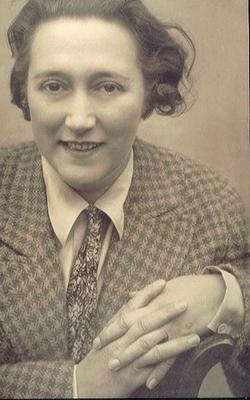Partner Simone Gentet
Queer Places:
Kaiserin Augusta Stift, Am Neuen Garten 31, 14469 Potsdam, Germany
 Christa
Winsloe (23 December 1888 – 10 June 1944) was a German-Hungarian novelist,
playwright and sculptor, best known for her play Gestern und heute
(known under several titles, see below), filmed in 1931 as Mädchen in
Uniform and the 1958 remake.
Christa
Winsloe (23 December 1888 – 10 June 1944) was a German-Hungarian novelist,
playwright and sculptor, best known for her play Gestern und heute
(known under several titles, see below), filmed in 1931 as Mädchen in
Uniform and the 1958 remake.
She was born in Darmstadt. After her mother's early death, she was sent to
the Kaiserin-Augusta-Stift, a very strict boarding school in Potsdam. In this
institution, the girls of the aristocracy were drilled to learn discipline and
submission. After leaving school, she married Baron Ludwig Hatvany
(1880–1961), a rich Hungarian writer and landowner.
While married to Hatvany, Winsloe wrote Das Mädchen Manuela ("The
Child Manuela"), a short novel based on her experiences at Kaiserin-Augusta.
Soon after, her marriage broke up, but Hatvany made her a generous allowance
after their divorce. That novel was released in 1933.
Winsloe was involved in a relationship with newspaper reporter
Dorothy Thompson,
probably before World War II when Thompson was reporting from Berlin.[1]
During World War II, Winsloe move to the US with Thompson.
Winsloe then wrote the stage play Gestern und heute (literally
"Yesterday and Today").[2]
The original title was rejected as too insipid, so the play was renamed
Ritter Nérestan (literally: "Knight Nérestan") when it appeared in 1930 in
Leipzig. When it was brought to Berlin, it was renamed again to Krankheit
der Liebe (lit. "Sickness of Love").
In 1932, her play was performed as "Children in Uniform" (English
adaptation by Barbara Burnham) at the Duchess Theatre in London with Cathleen
Nesbitt and Jessica Tandy in the cast.
The play's success led to the production of the film
Mädchen in Uniform (1931); Winsloe was one of the screenwriters.
Mädchen in Uniform was a considerable success, both financially and
critically. This was due to its ambitiously aesthetic form and the fact that
only women performed in it. The lesbian aspect of the story was downplayed and
depicted as an adolescent crush, even though Winsloe co-authored the script,
and Leontine
Sagan, who in the play had stressed the lesbian aspect, acted as director.
The play ends differently from the film. In the play, the young student,
Manuela, is destroyed because of rejection by her teacher, Fräulein Elizabeth
von Bernburg, who did not dare to side with Manuela against the headmistress
or oppose the brutal educational methods. Manuela commits suicide. The film is
more ambiguous, with von Bernburg attempting to defend the student and
herself. Christa Winsloe may be recorded as having written the first detailed
play on lesbianism in the Weimar Republic.
On the strength of the play's acclaim, Winsloe moved to Berlin, where there
was a lesbian sub-culture. She had plenty of money (from her ex-husband's
allowance), worked as an animal sculptor, and had a wide circle of friends.
She was a member of the SPD (the German Social Democrats, then largely reform
Marxist in orientation), and was open about her sexuality.
She moved to France in the late 1930s, fleeing the Nazis. During World War
II, she joined the French Resistance. Contrary to what is often stated, she
was not executed by the Nazis. Instead, on June 10, 1944, Winsloe and her
French partner, Simone Gentet,
were shot and killed by four Frenchmen in a forest near the country town of
Cluny.
My published books:


BACK TO HOME PAGE

- https://en.wikipedia.org/wiki/Christa_Winsloe
 Christa
Winsloe (23 December 1888 – 10 June 1944) was a German-Hungarian novelist,
playwright and sculptor, best known for her play Gestern und heute
(known under several titles, see below), filmed in 1931 as Mädchen in
Uniform and the 1958 remake.
Christa
Winsloe (23 December 1888 – 10 June 1944) was a German-Hungarian novelist,
playwright and sculptor, best known for her play Gestern und heute
(known under several titles, see below), filmed in 1931 as Mädchen in
Uniform and the 1958 remake. 
